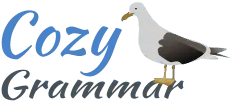
This month we wanted to share a video excerpt from Marie's Basic Cozy Grammar Course about conjunctions, as well as a companion video from Marie's Study Notes about clauses. Both videos are set on Marie's favorite Eagle Rock and give a sense for how the sea and the natural world around Marie's Cozy Beach Cottage form an important part of Marie's lessons.
In Lesson 22 of the course, Marie introduces co-ordinate conjunctions. Co-ordinate conjunctions, also called coordinating conjunctions, join words or groups of words used in the same way:
After this introduction, Marie goes on to give examples of conjunctions joining other kinds of words and groups of words: nouns, pronouns, verbs, adjectives, adverbs, phrases, and clauses.
Of these, I think one of the most interesting are clauses. In my companion video in Marie's Study Notes, I give a simple and straightforward way for understanding what a clause is. Take a peek!
We Were Very Tired, We Were Very Merry
While we're on the topic of clauses and conjunctions, I thought I'd give one more example of clauses in action.
Since Marie lived on an island, and since I live on an island, we're both very familiar with ferries. So here's a favorite poem of mine about ferries by Edna St. Vincent Millay.
As you read, see if you can count how many clauses she uses.
Recuerdo
We were very tired, we were very merry—
We had gone back and forth all night on the ferry.
It was bare and bright, and smelled like a stable—
But we looked into a fire, we leaned across a table,
We lay on a hill-top underneath the moon;
And the whistles kept blowing, and the dawn came soon.
We were very tired, we were very merry—
We had gone back and forth all night on the ferry;
And you ate an apple, and I ate a pear,
From a dozen of each we had bought somewhere;
And the sky went wan, and the wind came cold,
And the sun rose dripping, a bucketful of gold.
We were very tired, we were very merry,
We had gone back and forth all night on the ferry.
We hailed, “Good morrow, mother!” to a shawl-covered head,
And bought a morning paper, which neither of us read;
And she wept, “God bless you!” for the apples and pears,
And we gave her all our money but our subway fares.
(You can also read the poem on the Poetry Foundation website and learn more about Edna St. Vincent Millay herself.)
Depending on how you count them, the poet uses a total of 23-25 clauses, many of them joined with conjunctions.
* Here, although we have more than one verb, we have only one subject, so it’s a single, more complicated clause.
* Technically speaking, “we had bought somewhere” is also a clause (although a different kind than we’ve been talking about), so if you counted that one too, you’ve done extra well!
* Here, although we have more than one verb, we have only one subject, so it’s a single, more complicated clause. Also, technically speaking, “neither of us read” is also a clause (although a different kind than we’ve been talking about), so if you counted that one too, you’ve done extra, extra well!
A Fun Writing Activity
One of the best ways to understand grammar is to take it out of the realm of rules and regulations and explore it playfully in our own writing. For this month's creative writing activity, here's a fun way to explore clauses and conjunctions:
1) Write a series of simple sentences, each on its own card or slip of paper. These will become your clauses. The more imaginative the better! Remember, a simple sentence has both a subject and a predicate. (You can read more about subjects and predicates in our February newsletter.)
2) Shuffle your pieces of paper and pick two at random.
3) Now try to connect those two clauses using a conjunction. Here are some common conjunctions to get you started: and, but, or, and yet.
4) Repeat steps 2 and 3 until you've connected all of your clauses.
5) Now combine your sentences into a story, adding a few sentences in between if necessary. You may be surprised at what you end up saying!
Thanks so much for joining us. We'll see you again next month!

Warmly,
Thomas
Marie's Language Consultant
The Cozy Grammar Series of Courses
